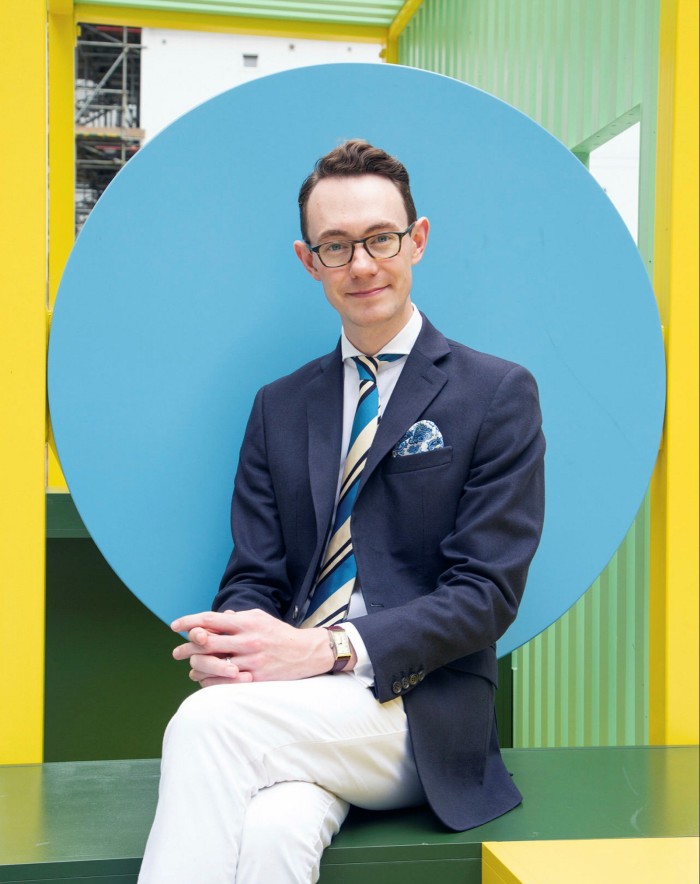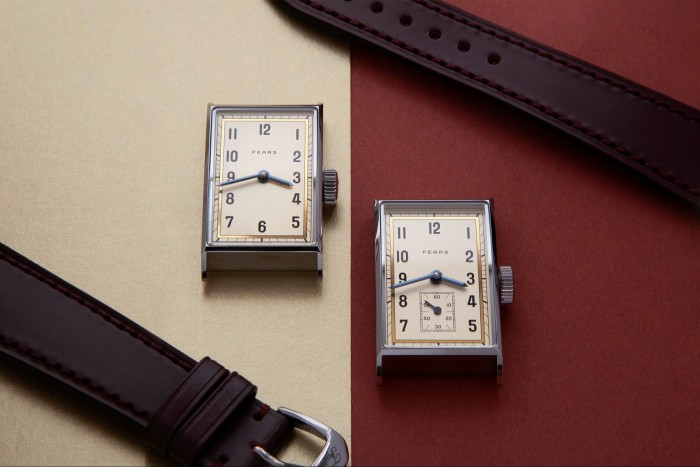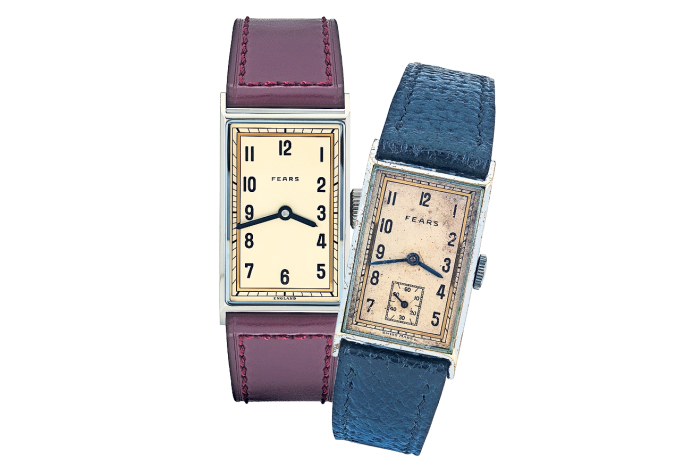Fears: The British family watchmaker winding back the years

Roula Khalaf, Editor of the FT, selects her favourite stories in this weekly newsletter.
Last March as Britain went into lockdown, Nicholas Bowman-Scargill took a job at an Asda supermarket. In the weeks leading up to that point, as the pandemic paralysed world economies, orders for his Fears watches had dried up. Sales were at zero.
Not wanting to lay off his small team or put suppliers in difficulty, and with the UK furlough scheme yet to kick in, the business continued to pay its bills — but he stopped taking pay. To keep both the company and himself afloat, the 34-year-old worked nights as a shelf stacker.
“I did five shifts a week for three months,” says Bowman-Scargill, whose navy blue jacket, cutaway collar and tie place him a world away from manual labour. “I’d work from 1.30am until 8am, come home, sleep for an hour, have breakfast, work on Fears from 10am till 5pm, then force myself to sleep till midnight, and start again.
“My car broke down in the first week. I had to walk. I got stopped by the police asking me why I wasn’t at home.”
Come May, Bowman-Scargill noticed a surge in Fears’ website traffic and orders began to trickle in. He left Asda — “people needed the job more than I did” — and went back to working “seven days a week” on his watch business.
Now, more than a year later, he is celebrating Fears’ 175th anniversary with an event at the top of The Shard, Britain’s tallest skyscraper, as well as a book telling the company’s history and a pair of limited-edition watches. In the first six months of this year, he says, he sold more watches than in the whole of 2020.
Hardship, it seems, is part of the Fears make-up. Founded in 1846 in Bristol by Edwin Fear, it was hit hard by wars and ultimately collapsed in the late 1970s, during what is now known as the quartz crisis, when many old-school makers of mechanical watches suffered as cheaper, more accurate battery-powered watches came out of Asia.
Bowman-Scargill rebooted the business in 2016 and describes himself as the company’s fourth managing director, following three generations of Fears — the last of whom, his great-grandfather, died in 1966 — and then a near 40-year hiatus in the company’s operating history.
Bowman-Scargill’s part in the story began in 2011. After graduating in economics from the University of York, he worked for a publishing house but found himself hungry for a career change. “I started to think as if I was a seven-year-old asking what I wanted do. It boiled down to two things: either a train driver, because I’m fascinated by the modern railway, or watchmaking.”
He chose the latter, writing a “two-page letter” to every watch brand he knew had a workshop in the UK. One of them was Rolex. The Geneva company offered him a job at its St James’s Square site in London as an apprentice watchmaker. “I thought I’d be there until my dying day,” he says. “Could you get any better than starting at Rolex?”
Before Bowman-Scargill had completed his five-year apprenticeship, he realised it wasn’t for him. “I have the millennial itch,” he says. “I want to do more. I don’t want to accept this is it.”
It was at his parents’ house in 2014 that he discovered he was descended from Edwin Fear. “My mother said, ‘Why don’t you restart the family watch company?’,” he recalls. “That was the lightbulb moment. I knew I had relatives who had been watchmakers, but I had no idea that they’d trained in [the German watchmaking town of] Glashütte and become managing directors of the west of England’s largest watchmaker.”
Within a few months, he would incorporate the company and become immersed in it. “There kept being occasions when I thought I could stop now without egg on my face,” he says of the months he spent researching what it would take to create a watch with the Fears name on the dial. “But every time I came to one of those moments, I just felt I had to keep going to the next one.”
Bowman-Scargill eschewed external investment. He sold possessions, including his Rolex watch, and curbed his lifestyle to build a £30,000 start-up fund. “That buys you very little setting up any company,” he says.
To save on watch design, marketing and branding, he enrolled on a 40-week evening course at City, University of London. “I’d finish at Rolex, jump on the bus to Islington, then do three hours of schooling until 9pm,” he says. “I knew that if I could design my watch, I could afford to do it. If I’d had to pay someone else, I would have had to stop.”
In February 2016, he left Rolex. “I was worried people would be angry,” he says. “But then Rolex weren’t that concerned I was going to set up a competitor overnight. It was scary leaving a pension and the security of a job.”
That summer, Bowman-Scargill’s first prototype was delivered. “When I put it on, I realised it was the first Fears watch in 40 years. I still wear it on launch days. It’s battered but symbolises everything I gave up.” In November 2016, Fears was reborn at SalonQP, the now defunct London watch show.
Business since then has been steady, rather than spectacular. Bowman-Scargill says his company has been profitable since 2019 and is now growing. In 2020, he says, Fears turned over about £250,000, more than twice what it did in 2019.
“During that first lockdown, you could buy a Fears, but not a Rolex, in the UK,” he says. Rolex only sells watches through bricks-and-mortar showrooms, which were closed during the first lockdown. “Lockdown levelled the playing field for a few months. [Last] summer, we had stock and were ready to sell. And my website is better at shipping a watch than most of the big watch companies.”
Bowman-Scargill’s problem now, he says, is that he is selling faster than he can bring watches to market. “First half of 2021, we have turned over everything we did last year,” he says. “Last year, we sold 100 watches; this year we’ve already sold 145. Everything is still out of stock on the website. We are selling batches of watches before they go live.”
Fears’ watches are classic-looking. “We’re focused unashamedly on elegant watches,” says Bowman-Scargill. All have Swiss mechanical movements, cases are made in either Germany or the UK, leather for straps is sourced in Bristol (they are then handmade in Belgium), packaging comes from around the UK, and assembly takes place in Norfolk.
Prices start at £2,850 and go up to £28,200 for a solid platinum, diamond-set version of the cushion-shaped Brunswick. Most of Fears’ pieces are sold via its website, but it also has a showroom and two stockists in the UK, and sells through The Rake, an online style platform.

Much of Fears’ success is down to Bowman-Scargill’s marketing ability. This summer, he launched the “Be Fearless” campaign, offering a loan watch to anyone going for a job interview.
His anniversary pieces are the first in a new family called Archival, a rectangular, Art Deco-style design inspired by a model produced by Fears in 1930. In August, two watches called Archival 1930 arrived, limited to a combined total of 175 pieces and powered by new old-stock hand-wound movements. Each is engraved with a year, from 1846 onwards.

Bowman-Scargill says he is confident that, at the current rate of growth, sales will increase to as many as 2,000 watches a year within five years, which will require substantial investment. Currently, the business employs just three other people, only two of whom are full-time, and it relies on suppliers for most of the legwork, including production. He wants to build the business up in Bristol, opening a workshop to assemble watches.
“In five years, when anyone around the world names a British company, I’d like Fears to be one of the first,” he says. “Not because of our volumes, but because of our reputation.”
Comments